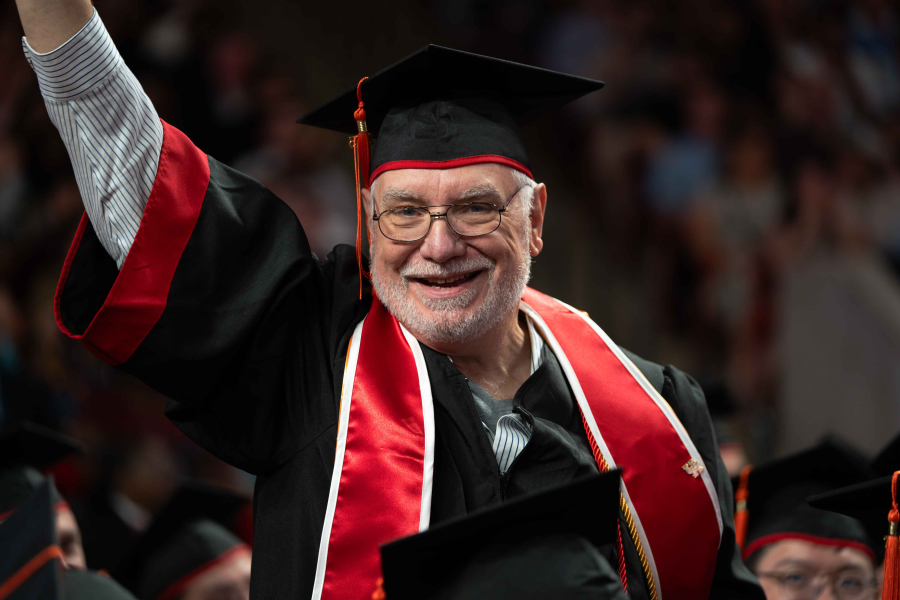What is Engineering Technology?
Based on the trademarked CDIO educational framework, the Engineering profession covers a range of activities from Conceive and Design to Implement and Operate. Technology is a vital component of the Implement and Operate phase of the CDIO model.
Devoted to the application of engineering principles and the implementation of technological advances that benefit humanity, engineering technology professionals apply their knowledge of mathematical and natural sciences gained through higher education with practical experience.
Our program prepares graduates for the practice of engineering in product improvement, manufacturing, and engineering operational functions. Progressive degree plans are reinforced with experiential learning as the educational backbone. Students focus on analyzing, applying, implementing and improving existing and emerging technologies through challenging project-based labs, synchronized with the lectures and designed to stimulate innovation.
FROM HELPING YOU MAKE DECISIONS ABOUT YOUR MAJOR TO MAKING PREPARATIONS FOR GRADUATION, WE ARE HERE TO ASSIST.
With our advanced facilities, award winning faculty and industry connections, the Engineering Technology department offers students unique opportunities to achieve their highest potential and graduate with confidence in their skills.
Bachelor of Science in Biotechnology
The Biotechnology program prepares students with a strong foundation in skills that transform our future world. With practical, hands-on training, innovative research and teaching, the program attracts students who are eager to discover ways to contribute to the health of society and the environment. The Bioprocessing and Bioinformatics tracks offer the flexibility to adapt the degree based on interests, educational background and career goals.
Bachelor of Science in Computer Engineering Technology
The Computer Engineering Technology (CET) Bachelor of Science (BS) degree is a research-oriented, project-based, practical program where students learn about analog and digital electronics, microprocessor architecture and programming, hardware and software design, networked embedded systems, operating systems, communication, and computer networks. The CET program incorporates applications such as cyber-physical systems, smart and clean energy, healthcare and bio-medical systems, smart sensors, and embedded controls.
Bachelor of Science in Electrical Power Engineering Technology
Earning a degree in Electrical Power Engineering Technology provides you with the right combination of skills for designing, analyzing, and improving computer-based power generation, delivery, and end-user systems. In addition to studying electrical motors and generators, computer-based controls, and alternative energy sources, you will learn about electrical power generating transmission and distribution systems, electrical power protection systems, and power electronics that increase the reliability and efficiency of electrical energy systems.
Bachelor of Science in Mechanical Engineering Technology
The Mechanical Engineering Technology program offers advanced teaching and research laboratories with courses in computer aided engineering, biomedical systems, advanced material design, manufacturing, systems integration, oil and gas applications, energy and efficient project management. Students gain highly developed expertise in design, analysis and manufacturing mechanical systems.
Master of Science in Biotechnology
The Master of Science in Engineering Technology - Biotechnology Track - emphasizes bioprocessing, protein engineering, computational biology, and federal regulations. Designed to help prepare individuals to conduct or supervise research and development in biotechnology or medical fields, this degree is a highly inter- and multi-disciplinary field that defines biotechnology education and research for the future.
Master of Science in Computational Health Informatics
The Master of Science in Engineering Technology with an emphasis in Computational Health Informatics is a highly interdisciplinary degree that aims at preparing the next generation of engineers for a career in the technological transformation of healthcare. The program places specific emphasis on mobile computing, medical imaging and instrumentation, wearable sensors, multimodal data mining, and information security as applied to health care delivery.
Master of Science in Mechanical Engineering Technology
The Master of Science in Mechanical Engineering Technology graduate program builds upon our recognized Bachelor of Science degree, providing students with highly developed expertise in design and analysis of mechanical systems. The M.S. program offers courses and leading-edge research experience in several applied areas including instrumentation and measurement, biomedical systems, advanced materials design, manufacturing, systems integration, oil and gas applications, and energy.
Master of Science in Network Communications
The Master of Science in Engineering Technology with an emphasis in Network Communications is advances your knowledge of computer networking. Supported by industry partnerships, the program encourages students to gain real-world practical experience. Graduates of our program land management and supervisory roles in virtually every industry where networking technologies are essential. The comprehensive program offers courses ranging from networking fundamentals, security, network management to protocols, and algorithms. It prepares you for a variety of application areas such as optical networking, sensor networks, wireless networks and network programming. In addition to an enriching academic experience, there are opportunities for competitive research and instruction funding.
ET Minors
Students wishing to obtain a minor may choose any approved minor program within the Technology Division at the Cullen College of Engineering. Students who have declared a major in Mechanical Engineering Technology may not declare a minor in Manufacturing Systems. Minimum requirements range from 15 to 18 semester hours of course work, of which 9 must be advanced; 9 semester hours in residence at UH of which 6 must be advanced; and a 2.0 minimum grade point average in all courses in the minor at the University of Houston. For official requirements, see the University of Houston Catalog.
- Bioinformatics in Biotechnology and Biomedical Sciences
- Bioprocessing in Biomedical and Biopharmaceutical Sciences
- Computer Engineering Technology
- Electrical Power Engineering Technology
- Manufacturing Systems
See an Advisor
Students are encouraged to visit with their advisor regularly to update their degree plan and to stay informed about the resources offered by the Technology Division at the Cullen College of Engineering.
Advising Forms
Forms necessary for your academic planning including change of major, and general petition form.
Contact Us
College of Technology Building
4730 MLK Blvd. #304
Houston, TX 77204-4020
Phone: 713-743-4040
Fax: 713-743-4032
Student Organizations

Institute for Electrical and Electronics Engineers
IEEE, the Institute of Electrical and Electronics Engineers, is the world’s largest professional association dedicated to advancing technological innovation and excellence for the benefit of humanity.
Institute of Marine Engineering, Science and Technology (IMarEST)
As a global community, IMarEST is active in the marine sector. Student membership is free. Members can attend local Houston events organized by IMarEST throughout the year and network with distinguished professionals in marine industry.
Institution of Mechanical Engineers
Objectives of the Institution of Mechanical Engineers are to supplement the existing curriculum with a series of hands-on workshops, as well as to provide a vehicle for connecting students with potential mentors within the industry.
International Society of Automation
Enable members, including world-wide subject matter experts, automation suppliers, and end-users, to work together to develop and deliver the highest quality, unbiased automation information, including standards, training, publications, and certifications.
Marine Technology Society
The University of Houston Marine Technology Society Student Chapter is working to lead the way in solving global issues by enhancing the dissemination of marine technology information with related educational programs.
Society for Biological Engineering
The Society for Biological Engineering devotes their efforts to integrating our members with industries that can benefit from the knowledge and skill-set of an engineer, technologist, and biologist combined.
Society of Manufacturing Engineers
The Society of Manufacturing Engineers is a great way to connect with the industry through technical lectures, plant tours, and conferences.
American Society of Mechanical Engineers
Here at the University of Houston, ASME — Technology Division at the Cullen College of Engineering strives to support the academic & professional development of students pursuing engineering technology degrees. Join us on this journey as we set the standard!


